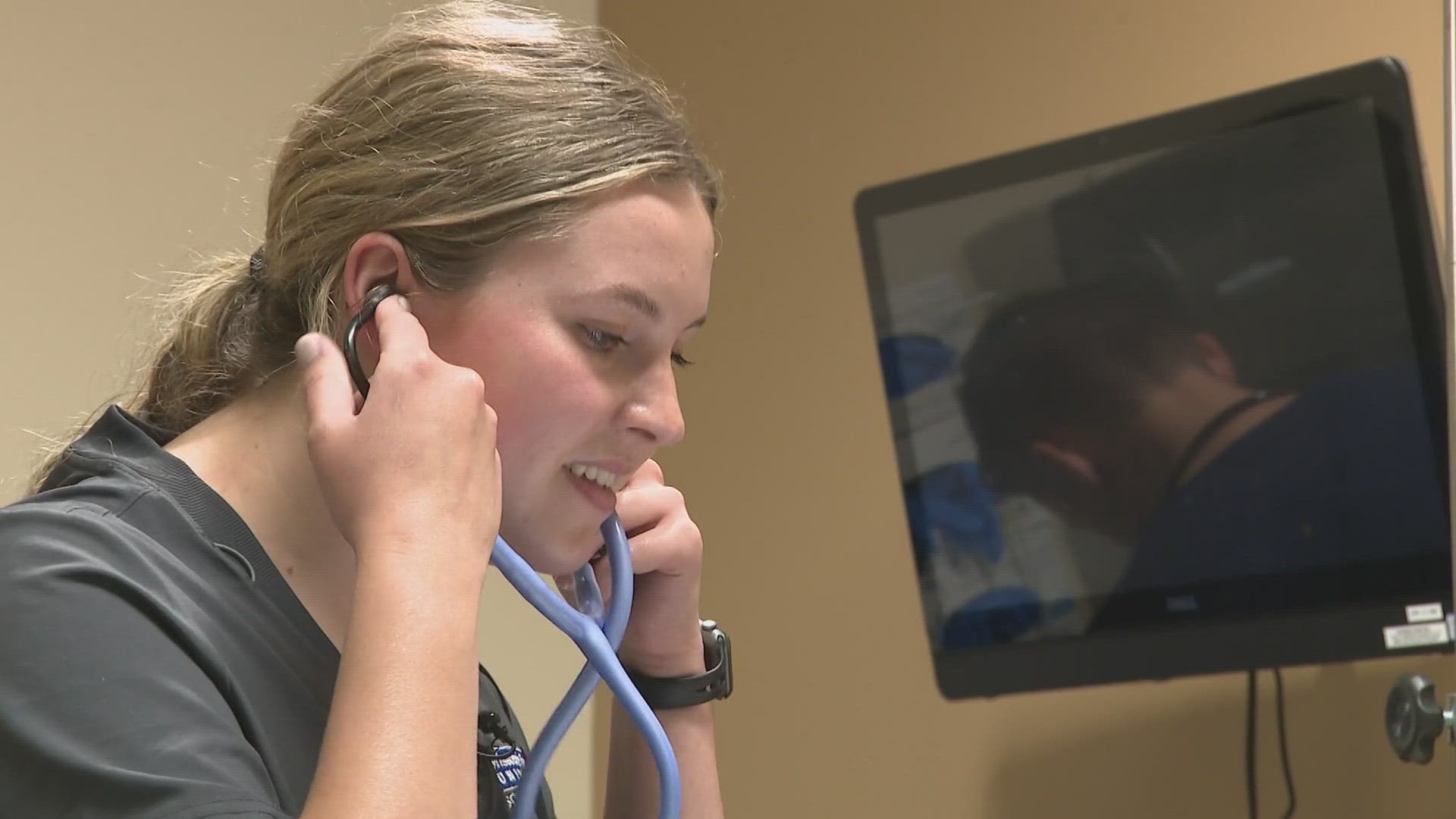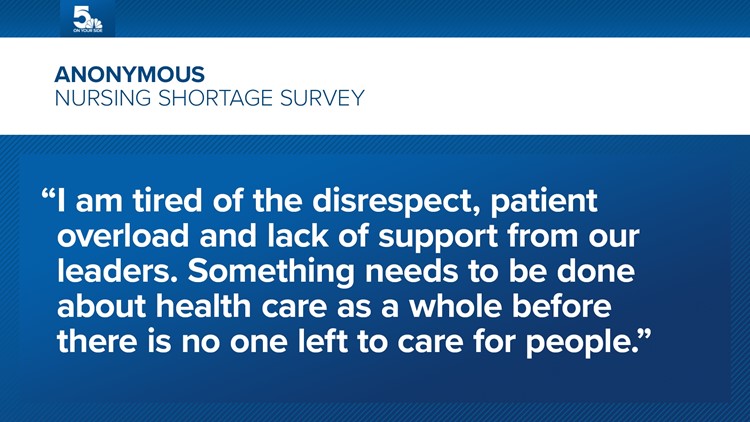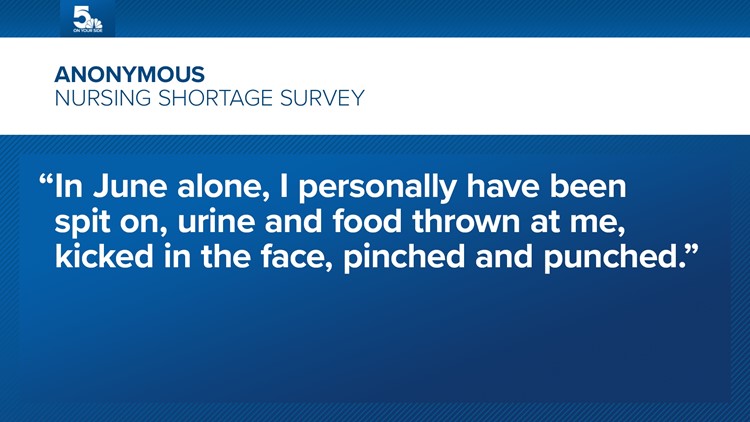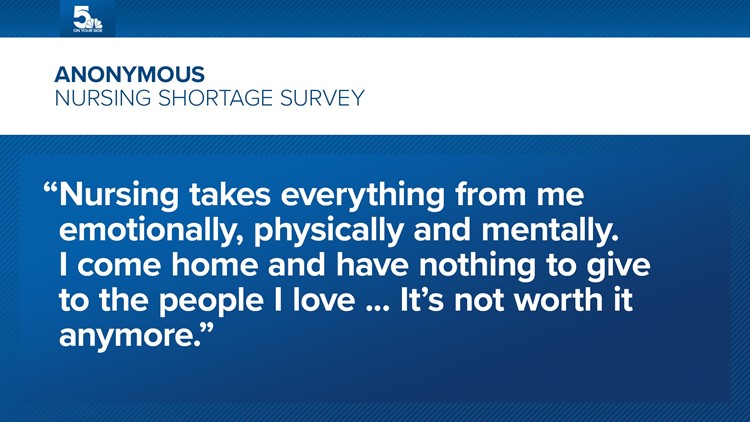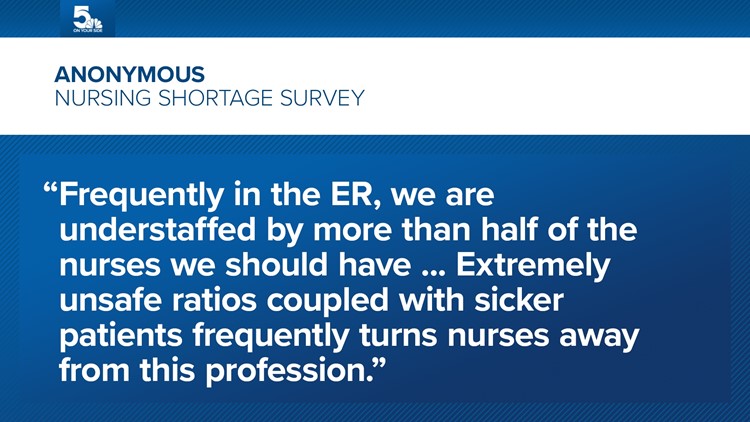ST. LOUIS — There’s a nursing crisis going on in the St. Louis area and across the country. Nurses are leaving the profession in record numbers, and it’s impacting how we’re all cared for when we need help.
“This is where you're going to have all of our patients that are in the beds," said Makenzie Buescher, a nursing student at Missouri Baptist University, showing us what her typical day is like.
She is one of the first fast-tracked nursing classes at Missouri Baptist University, where students passionate about a career in nursing spend their days with eerily lifelike mannequins.
“Yes. And they blink and they breathe and they talk," Buescher said.
The students crunch two years' worth of schooling into half that time.
“So that's a jam-packed program," Senior Investigative Reporter Paula Vasan said.
"Yeah, it's very crazy," Buescher said.
It's because there’s such a need for people like 25-year-old Buescher. For her, it’s a calling.
“I grew up helping, you know, my grandparents. They helped raise me, so I help take care of them," she said.
But often, there are not enough nurses to take care of us.
“Yes, it is impacting me as a patient," said Pamela McLucas, who was recently discharged from St. Louis University Hospital. She suffered from a painful ulcer, a complication of diabetes.
"I found out that almost everyone who serviced me are traveling nurses," she said. “We'd also like to see people here in St. Louis who want to be committed to the community, live in the community and serve the community.”
The industry’s largest labor union National Nurses United tells us corporate executives too often favor profit above safe staffing levels, and it’s putting nurses in danger.
Data shows in 2022, there were more than one million registered nurses with active licenses who were not employed as registered nurses. A spokesperson with National Nurses United said lack of pay, inadequate nursing jobs and burnout are pushing people out of the industry.
“I had a bottle, full bottle of urine thrown at me. And then just last week, I was smacked by a patient," said Rachel Williams, a St. Louis University nurse. We met her outside of St. Louis University Hospital during a rally for more protection.
“What do you see as solutions?" Vasan asked.
"More nurses to take care of the patients ... We can't properly care for them," she said.
That’s pushing nurses out of the industry. A recent survey of over 270 hospitals by NSI Nursing Solutions Inc., a national registered nurse recruitment firm, found the turnover rate among nurses just last year was about 23%.
But we found the students we met at Missouri Baptist University to be undeterred and hopeful, despite serious challenges.
“I'm just ready to help someone and help people," Buescher said.
To find out what exactly nurses are dealing with, 5 On Your Side's I-Team surveyed 749 nurses in our area. To get our survey into the right hands, we sent it to some of the biggest industry organizations, hospital systems and nursing schools. To sort through the data, we worked with a data expert and adjunct professor at Webster University, Scott Granneman. We also worked with Jans Carton, a data expert and principal at WebSanity, a web development firm.
Among those who responded, 77% said they had considered leaving the job in the last year. Their top reasons: being underpaid, inadequate staffing and workplace violence.
St. Louis-area nurses share stories of burnout, severe staffing shortages, abuse by patients
One person writes: “We had two staff members stabbed in the ER.”
Another writes: “I personally know two nurses that were pregnant and kicked in the stomach … Two miscarriages.”
It’s no surprise, then, that 92% of people said their workplace is dealing with a staffing crisis. Nurses told us their patients are dealing with longer wait times and medical complications. Nearly half told us patients are leaving the hospital before they should because of not enough people to care for them.
“Does that concern you?” Vasan asked.
“It's concerning, but I think you have to remember that this is a calling for, you know, certain people. And if you really love what you do, that's all that kind of really matters," Buescher said.
It’s why Missouri is trying to get more of that passion in the pipeline. A spokesperson with the Missouri State Board of Nursing said lawmakers added an extra $5 million for the first time this year into the state budget to help 81 nursing schools in Missouri enroll more students.
The Missouri State Board of Nursing has a nursing education incentive program. This makes grants available to nursing education programs to increase capacity so more nursing students can be enrolled. This program was established in 2011 by legislative action. To date, 169 proposals have been received with 73 proposals funded. A total of $13 million has been awarded to nursing education programs. A spokesperson with the Missouri State Board of Nursing said fewer students are being turned away from nursing programs. Since 2011, the board has helped decrease the number of people in Missouri turned away by nearly 69%, from 3,933 to 1,221.
Click here for a full list of the 81 nursing schools in Missouri eligible for the extra $5 million in state funding (see pages 5-14).
“We didn't have a nursing program at all, so I built it completely from scratch," said Dr. Amber Pyatt, dean of the Missouri Baptist University School of Nursing.
Seven years later, Dr. Pyatt is seeing her work pay off.
“So we're hoping that little by little we can graduate those people that can go out and they can hopefully make some of those changes that can then kind of trickle down," she said.
“What do you think needs to change within the industry to make this profession sustainable?” Vasan asked.
“I think increasing the pay a little bit more," Buescher said. “Decrease the burnout rate, decrease the exhaustion and all of that.”
Another student, David Little, said: “I mean, how can I provide the adequate care that people need if I'm required to get pulled left, right and center and everywhere all the time? ... Hopefully, maybe make my change there.”
Their class will be the industry’s future, and they hope to be part of the solution.
To share a tip with the 5 On Your Side I-Team, use the form below or send us an email at tips@ksdk.com.
Statements from St. Louis-area health care systems and industry associations:
A Mercy spokesperson tells us in an email: "Mercy is experiencing the impact of the national nursing shortage. That impact varies by community, by hospital and by specific nursing units. Patient to nurse ratios also vary by patient population and nursing unit. In addition to hiring agency nurses as needed, we are working to increase nurse availability and have improved retention rates by offering more flexibility with shifts and work locations, including an app for nurses to choose their own hours. We offer an international nurse program to help bridge the workforce gap created by the multi-decade national nursing shortage in the U.S. Mercy is educating students as young as middle school about the variety of jobs available in health care. Interested candidates can view Mercy’s many open jobs available across four states here."
A BJC HealthCare spokesperson told us in an email: "Even before the pandemic, the healthcare industry faced an ongoing nursing shortage. COVID-19 amplified the need and caused nurses to leave the bedside due to the unprecedented work and demands. This is the same challenge other hospital systems across the country are facing. Over the past year, we have seen retention consistently improve and hiring rates increase. We are also working on ways to improve the work experience for all of our clinicians. BJC HealthCare is actively recruiting many patient care positions, which can be found at BJC.org/jobs. Ratios are determined based on the specific patient population being cared for. We follow recommendations of professional organizations by specialty."
SSM Health spokesperson Jennifer Wiegert said: "At SSM Health, we are committed to providing high-quality, compassionate health care services to every community we serve. Our top priority is the safety of our team members and patients. Nursing care delivery models are based on specific populations and acuity and are underscored by the recommendations of professional organizations. COVID-19 impacted the nursing profession significantly due to the unprecedented challenges nurses everywhere faced. Over the last year, many health systems including SSM Health have seen turnover decrease and hiring increase, as we have focused on the wellbeing and care of our caregivers. At SSM Health, we are actively recruiting many clinical positions and those positions can be found at ssmhealth.com/careers."
St. Luke’s spokesperson Kelly Webb-Little tells us: "Prior to the pandemic, the healthcare industry faced an ongoing nursing shortage. COVID-19 amplified the need and caused nurses to leave the bedside due to the unprecedented work and demands. This is the same position other hospital systems both locally and nationally are facing. Over the past year, St. Luke’s has seen turnover consistently lessen and hiring rates increase. We are actively recruiting many patient care positions, and those positions can be found at stlukes-stl.com/careers/. Ratios are determined based on the specific patient population being cared for. We all follow recommendations of professional organizations by specialty."
Dave Dillon, a spokesperson with the Missouri Hospital Association, told us: "Hospitals have robust security systems and engage in training to identify and deescalate situations that could result in harm to a patient or a caregiver. However, no system is flawless. Missouri has laws that protect hospital caregivers. Nonetheless, these professionals realize that the stress of the hospital environment, mental health and substance abuse, and the erosion of courtesy that we often see in the community, can manifest in the hospital. As a result, very few patients or visitors are charged with violence when it occurs... Fatigue and burnout are not surprising, despite the commitment many nurses and other health care professionals have to caring for their community. These jobs can be highly rewarding, but they also can be stressful. What Missourians must understand is that they are essential... What happens in the community often spills over into the hospital. Training, attracting and retaining nurses and other staff is harder when they are not provided the respect they are due.”

